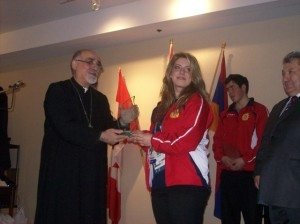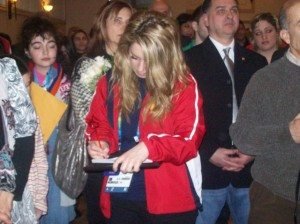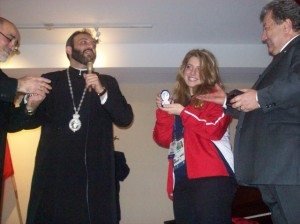Being able to represent a country at the Olympics is not the easiest thing to do, but for the fortune few who get that opportunity, it is an experience not likely to be forgotten.

For athletes who want to participate in the Olympics, it is more than just a game, it is about national pride.
“My brother and I were born in the United States and were skiing for the U.S.,” explained Ani Serebrakian, “but we are Armenian, and so we made the decision, about two to three years ago, that we wanted to ski for Armenia. From there, we both switched—we had dual citizenship—so we started skiing for Armenia.”
Since turning in the red, white, and blue for Armenia’s red, orange, and blue, the 21-year-old University of San Francisco (USF) student competed in several alpine skiing events with the hope of qualifying for the 2010 Games in Vancouver.
“I was able to be here [Vancouver] because my qualifying points were low enough,” she said.
Though she was able to race, she always started with a high number, and was one of the last competitors to go down the hill.
“The reason for me always having a high number is because of my points—they are high. My last score in an event was two years ago in New Zealand. I haven’t competed because of injury… I am what is called a reckless skier. I crash a lot. I am very intense. When I finish a race, it is great, amazing, but unfortunately, when I don’t finish a race, the same can be said,” Serebrakian added.
Her two runs in Vancouver saw her pull out after hitting her hand on a gate and then being disqualified, due to equipment issues.

“On my first run, my arm just completely hooked the gate. Just out of pain, I pulled out. That has never happened to me before. I’ve never hooked the gate. It was due to the snow conditions, the fog. I’d never skied in fog before. Though I had the right lenses on, it was an accident, it happens,” she said.
What about the second run?
“I got disqualified due to my ski binding…”
The International Ski Federation’s rule book states that binding or equipment can have a lee-way of -1 c.m. or +1 c.m. “My binding was up, over the +1 c.m. Before, when my teammate and I went to get measured, it was fine. It wasn’t a lot, it was snug, so it passed. But unfortunately sometimes, when you push out of the gate hard, the binding goes up.”
“Binding is supposed to be tight. With me, maybe the screws were a bit loose. I don’t know, you can’t see that stuff, but it was a millimeter off, like a hair. Even with the +1 c.m. allowed, it was up. I was there when the measurement was taken and I tried to plead my case, but no. It wasn’t just me—another girl also [Irish Kirsten McGarry] had the same problem. I didn’t know what to say. It is not like I did on purpose, it just happened,” Serebrakian said.
“Again, these things happen. It doesn’t matter if you’re ranked high or not. Even Body Miller crashed. Even in the Utah Olympics he didn’t finish a race. The best racer in the world crashes and so does the worst skier. It is what makes skiing so fun to watch and do.”
One question that many newcomers to the sport have is why, after the first 30 skiers, do all the other skiers come 10-15 seconds behind.
“The skiers who go down in the top 30 are the best in the world,” Serebrakian explained. “Their ranking and points give them the ability to go down in the first group with fresh snow on the mountain. The reason for the huge disparity in time is basically snow conditions. As skiers go down the hill, they create ruts, they are pushing the snow up, the weather conditions change as time goes on—so many issues which have nothing to do with the skier.”

Serebrakian was one of only four athletes for Team Armenia. Did pressure also come into play?
“I don’t let the pressure get to me because I’ve always been on enjoying the race. What good will it do if I am about to race and I am scared? I am representing others, but I am doing it for myself as well. I don’t bother with what others will think or say about me because I know that everyone is proud of us just for making it this far to the Olympics,” she said.
One problem with being an Olympian is the pay. She doesn’t get paid, but she doesn’t see that as a deterring factor. “It never crossed my mind. I am only sponsored, so I get equipment to ski on. But, no, money was never the issue. Obviously, if I win, I can get paid with the medal, but other than that, I never asked for money because I wanted to ski and I wanted to ski for Armenia,” she added.
And what about the future? “This experience really juiced me up. I love skiing, but this really made me fall in love with it, all over again. The support, the fans, the whole process. I will go back to school at USF and finish my undergraduate in exercise and sports science. And then, I will ski. I want to focus on skiing and qualify for Sochi, Russia [the host city of the 2014 Olympics]. I want to not only finish the races that I am in, but I want to do…amazing,” she said, with a smile on her face.
The 2014 Winter Olympics will be only two years away once she graduates. But the qualification to get to Sochi is not something she is worried about.
“The qualification for 2014 will be the same as it was for Vancouver. Since Armenia doesn’t have many in the top 500 for my discipline (alpine), they can only take one girl. I just know that in two to three years from now, my points…they will be nowhere near where they are now. I’ll drop the points I have because of me not finishing races and I can go even lower with practice. If Armenia wants to send another girl, I will need to be in the top 500, but when I say I will be at Sochi, it is with confidence.”
As for what she needs to do to win a medal: “Easy, just work harder and stay focused,” was her quick answer.
(Photos by Antranig Dereyan)


DEREYAN, I would like to know more about the disqualification due to the Ski Binding. We wife and I work in the Ski industry. Nicole is a Sinior Examiner for P.S.I.A. [ professional Ski Instructors of America] We are not far from San Francisco living at Lake Tahoe. Was adjustment, repair or replacement not permitted? Richard